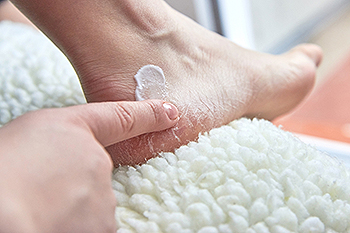
Dry, cracked heels are a common issue that can cause discomfort. These fissures in the skin often result from dryness, pressure, or various lifestyle and medical factors. While not usually a severe health concern, untreated cracked heels can become painful. This condition typically starts with dry skin. Daily activities such as standing, walking, or running exert pressure on the feet, causing the heel pads to expand. When combined with dryness, the skin can crack, creating openings for bacteria and viruses. Other potential causes of cracked heels include lifestyle choices that can include walking barefoot, taking hot showers, or using harsh soaps. Wearing ill-fitting shoes with poor support can also contribute to cracked heels. On a medical front, factors like diabetes, vitamin deficiencies, fungal infections, and hypothyroidism may also lead to developing cracked heels. Preventing cracked heels involves addressing dry skin and its underlying causes. Moisturizing is key, and products such as custom shoe inserts, padded socks, and heel relief sleeves can help protect and hydrate the skin. To treat existing dry, cracked heels, it is helpful to focus on hydration and protection. If this problem persists or causes pain, it is strongly suggested that you make an appointment with a podiatrist for a more advanced treatment plan.
Cracked heels are unsightly and can cause further damage to your shoes and feet. If you have any concerns, contact one of our podiatrists from Sutera and Jones Surgical Podiatry. Our doctors can provide the care you need to keep you pain-free and on your feet.
Cracked Heels
Cracked heels appear unappealing and can make it harder for you walk around in sandals. Aside from looking unpleasant, cracked heels can also tear stockings, socks, and wear out your shoes. There are several methods to help restore a cracked heel and prevent further damage.
How Do You Get Them?
Dry skin is the number one culprit in creating cracked heels. Many athletes, walkers, joggers, and even swimmers suffer from cracked heels. Age and skin oil production play a role to getting cracked heels as well.
Promote Healing
Over the counter medicines can help, especially for those that need instant relief or who suffer from chronic dry feet.
Wear Socks – Wearing socks with medicated creams helps lock in moisture.
Moisturizers – Applying both day and night will help alleviate dryness which causes cracking.
Pumice Stones – These exfoliate and remove dead skin, which allows for smoother moisturizer application and better absorption into the skin.
Change in Diet
Eating healthy with a well-balanced diet will give the skin a fresh and radiant look. Your body responds to the kinds of food you ingest. Omega-3 fatty acids and zinc supplements can also revitalize skin tissue.
Most importantly, seek professional help if unsure how to proceed in treating cracked heels. A podiatrist will help you with any questions or information needed.
If you have any questions, please feel free to contact one of our offices located in Media, Glen Mills, Riddle Memorial Hospital, and Concordville, PA . We offer the newest diagnostic and treatment technologies for all your foot care needs.
